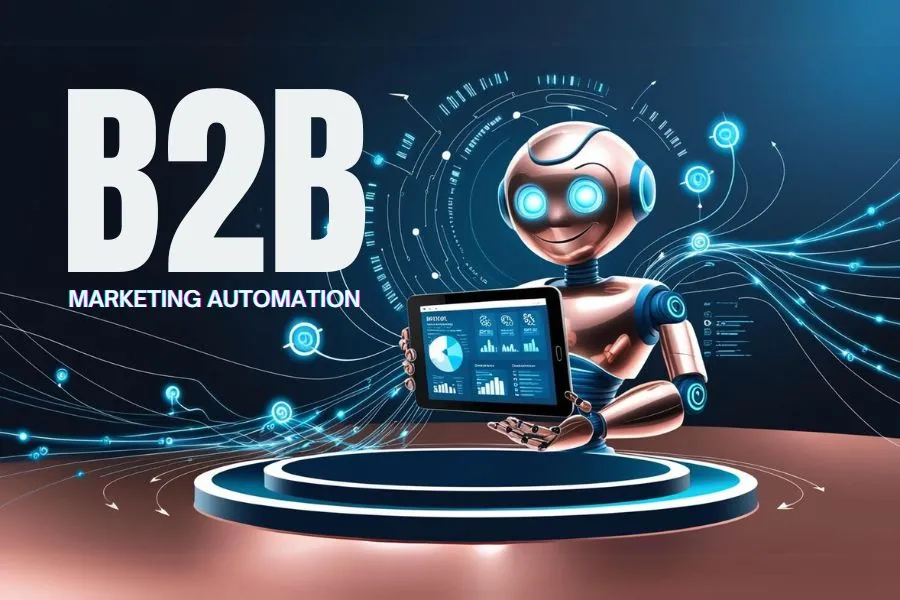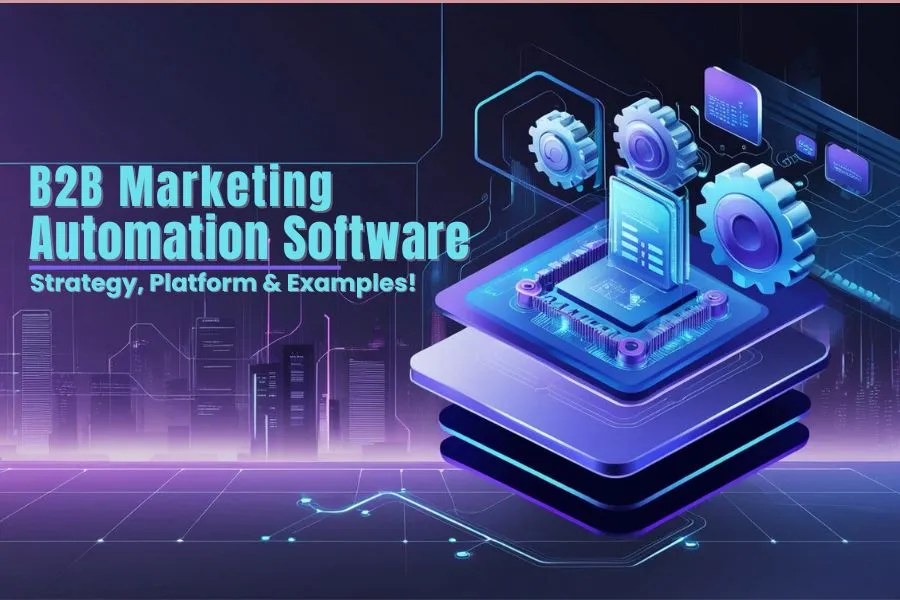Table of Contents
Introduction to B2B Marketing Automation Software
B2B Marketing Automation Software is a game-changer for businesses. This technology automates repetitive marketing tasks, streamlines processes, and enhances communication with potential and existing clients. As B2B companies navigate complex sales cycles and multi-stakeholder decisions, automation software enables them to generate, nurture, and convert leads more effectively, ultimately driving sales growth and operational efficiency. In this blog, we will explore B2b Marketing Automation Strategy and B2b Marketing Automation Examples
Popular B2B Marketing Automation Software

With numerous B2B Marketing Automation Platforms available, choosing the right one depends on your company’s size, budget, and specific needs. Platforms are given below:
1. HubSpot – Known for its CRM integration, HubSpot offers email marketing, lead scoring, and analytics.
Example: HubSpot can automate email campaigns based on a lead’s behavior, such as sending a personalized email to a lead who has visited your pricing page.
2. Marketo – Excellent for large enterprises, Marketo provides extensive features and strong customization options.
Example: Marketo can be used to create complex multi-channel campaigns that involve email, social media, and web personalization.
3. Pardot by Salesforce – A robust choice for Salesforce users, Pardot is highly effective for lead nurturing and scoring.
Example: Pardot can automatically score leads based on their engagement with marketing materials and assign them to the appropriate sales rep.
4. ActiveCampaign – Popular for SMBs, it offers user-friendly automation workflows and excellent customer support.
Example: ActiveCampaign can automate follow-up emails to leads who have attended a webinar, including personalized recommendations based on their interests.
B2B Marketing Automation Software Features
A typical B2B marketing automation tool comes packed with features that streamline marketing tasks and improve efficiency. Here are some of the essential features:
1. Lead Scoring and Management
Lead scoring ranks leads based on their likelihood to convert, allowing teams to prioritize high-quality leads.
Example: A B2B tech company uses a marketing automation tool to assign scores to leads based on factors like job title, company size, and website visits.
- HubSpot: A popular marketing automation platform that offers advanced lead scoring capabilities.
2. Email Marketing Automation
Automated email campaigns keep leads engaged, delivering timely messages that cater to their interests and position in the sales funnel.
Example: A B2B SaaS company sends automated email sequences to nurture leads, including welcome emails, product demos, and case studies.
- Marketo Engage: A powerful marketing automation platform that excels in email marketing automation.
3. Customer Segmentation
This feature groups customers into segments based on demographics, behavior, and engagement, enabling more targeted marketing.
Example: A B2B consulting firm segments its customer base into small, medium, and enterprise businesses to tailor marketing messages and offers accordingly.
- Salesforce Marketing Cloud: A comprehensive marketing automation platform that allows for sophisticated customer segmentation.
4. Analytics and Reporting
Tracking performance metrics helps companies make data-driven decisions and optimize campaigns for better results.
Example: A B2B software company tracks key metrics like email open rates, click-through rates, and conversion rates to measure the effectiveness of its marketing campaigns.
- Adobe Analytics: A powerful analytics tool that integrates with marketing automation platforms to provide in-depth insights.
B2B Marketing Automation Strategy
An effective B2B Marketing Automation Strategy is essential for aligning marketing goals with automation tools. It involves creating targeted campaigns that cater to each stage of the buyer’s journey, from awareness to decision-making. This approach helps B2B companies to personalize communications, nurture leads consistently, and maximize conversions.
Key Elements of a Successful Strategy
- Goal Setting – Define clear objectives.
Example: Increase qualified leads by 20% in the next quarter.
- Lead Segmentation – Group leads based on demographics and behavior.
Example: Divide leads into segments based on industry, company size, and job title.
- Personalized Content – Tailor messages to the needs of each lead group.
Example: Send targeted email campaigns with personalized subject lines and body copy.
- Integration with CRM – Synchronize data for seamless sales and marketing.
Example: Automatically sync lead data between your marketing automation and CRM systems.
B2b Marketing Automation Examples

Many businesses have effectively used automation to enhance their marketing efforts.
- For example, Cisco utilizes automation for lead generation and nurturing, increasing engagement through personalized email campaigns.
- Similarly, Dell uses automation to segment and target leads with precision, improving conversion rates.
Conclusion
B2B marketing automation is transforming how businesses engage with leads, nurture prospects, and convert clients. With the right strategy, platform, and practices, B2B companies can streamline operations, enhance customer experiences, and improve ROI. Investing in the right tools and understanding how to maximize their potential is crucial in today’s competitive market.
FAQs
1. What is B2B Marketing Automation Software?
B2B marketing automation software automates tasks like lead generation, email marketing, and customer segmentation, enabling businesses to scale their marketing efforts.
2. How does automation improve B2B marketing?
Automation boosts efficiency by handling repetitive tasks, allowing teams to focus on strategic efforts and enhancing personalization.
3. Which B2B marketing automation platforms are popular?
Popular platforms include HubSpot, Marketo, Pardot, and ActiveCampaign, each offering unique features for different business needs.
4. Can small businesses benefit from B2B marketing automation?
Yes, automation helps small businesses manage leads effectively, scale marketing, and personalize customer experiences.
5. What are the future trends in B2B marketing automation?
Future trends include AI-driven personalization, predictive analytics, and a strong focus on enhancing customer experiences.

